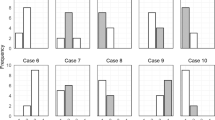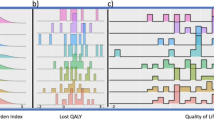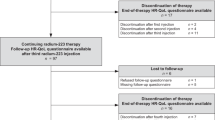Abstract
Health-Related Quality of Life (HRQOL) is an important outcome measure in the study of prostate cancer. There are few data regarding the effect of sociodemographic variables, such as insurance status, educational level, marital status or income, on HRQOL. We examined whether these or other sociodemographic and clinical variables are predictive of HRQOL outcomes using an observational database of prostate cancer patients accrued from a wide array of clinical practice settings.
We studied 131 patients with newly-diagnosed prostate cancer who had been followed for at least nine months. Patients were enrolled in CaPSURETM, a large, observational database of patients with prostate cancer. General and disease-specific HRQOL were measured with established, validated instruments at diagnosis and nine months later. Sociodemographic data and co-morbidity counts were recorded at baseline. Multivariate regression analysis was used to determine whether sociodemographic or clinical variables were predictive of baseline HRQOL or HRQOL changes during the study period.
Several sociodemographic and clinical variables demonstrated significant associations with HRQOL. We found improvements in general and disease-specific domains of HRQOL during the nine months after diagnosis. For married patients, Emotional Well-Being and Family Functioning scores were better at baseline (+11.8, P<0.02), but Family Functioning declined over the nine month study period (−18.5, P=0.0006). Older patients had slightly better baseline performance in several domains of HRQOL, but experienced greater HRQOL decrements over time than did younger patients. Increasing comorbidity was associated with worse baseline general HRQOL. Early tumor stage was predictive of better scores in general HRQOL domains at baseline. Limited palpable disease stage (T2A/T2B) was predictive of worse Sexual Function and Sexual Bother at nine months (−8.6, P=0.04; −24, P=0.008).
After initial decreases, patients appear to experience an improvement in general and disease-specific HRQOL within nine months of initial diagnosis with prostate cancer. Marital status is associated with better HRQOL, while advancing age is associated with more significant HRQOL declines over time. Patients with lower stage disease were noted to have better general HRQOL at baseline, although decreases in the physical domains were noted at nine months. These data shed new light on patients' experience with prostate cancer and suggest that HRQOL outcomes over time may occur in a predictable manner.
This is a preview of subscription content, access via your institution
Access options
Subscribe to this journal
Receive 4 print issues and online access
$259.00 per year
only $64.75 per issue
Buy this article
- Purchase on Springer Link
- Instant access to full article PDF
Prices may be subject to local taxes which are calculated during checkout
Similar content being viewed by others
Author information
Authors and Affiliations
Rights and permissions
About this article
Cite this article
Penson, D., Litwin, M., Lubeck, D. et al. Transitions in health-related quality of life during the first nine months after diagnosis with prostate cancer. Prostate Cancer Prostatic Dis 1, 134–143 (1998). https://doi.org/10.1038/sj.pcan.4500228
Received:
Revised:
Accepted:
Published:
Issue Date:
DOI: https://doi.org/10.1038/sj.pcan.4500228
Keywords
This article is cited by
-
Social disparities and prostate cancer: mapping the gaps in our knowledge
Cancer Causes & Control (2005)
-
Quality of life following prostate cancer treatments
Current Urology Reports (2000)



